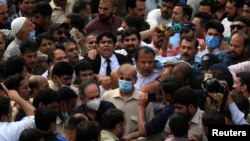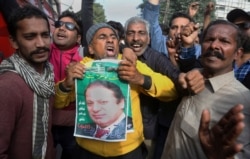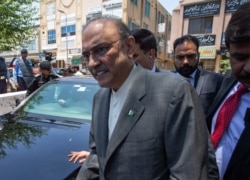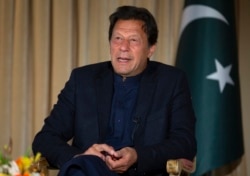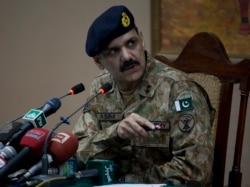Pakistan's anti-corruption authorities Monday arrested the leader of the opposition in Parliament, Shehbaz Sharif, after a high court rejected his bail plea in a money laundering case.
Sharif, president of the Pakistan Muslim League (Nawaz) (PML-N), was taken into custody from the court's premises in the eastern city of Lahore. His wife, sons and daughters are also accused in the case.
Shortly before his arrest, Sharif denied any wrongdoing as the chief executive of Pakistan's most populous province of Punjab.
His elder brother, Prime Minister Nawaz Sharif, was ousted in 2017 after a court sentenced him to a seven-year jail term for possessing assets beyond his known sources of income.
The former prime minister is undergoing medical treatment in London where the Sharif family owns expensive property, the subject of court cases instituted against them in Pakistan.
Monday's legal action against Sharif came hours after Asif Ali Zardari, a former president of the country and leader of another opposition party, was also indicted on money laundering charges.
Zardari's sister, Faryal Talpur, and 13 other people were also indicted during Monday's hearing in Islamabad. All the accused pleaded not guilty.
Anti-corruption officials say the charges stemmed from money laundering through fake Pakistani bank accounts and companies.
The illicit financial outflows occurred when Zardari was serving as the president of the country from 2008 to 2013. His Pakistan Peoples Party (PPP) was leading the ruling coalition at the time.
Zardari, widower of slain former Prime Minister Benazir Bhutto, is a member of the national legislature and faces a number of corruption-related court cases.
The former president's son, lawmaker Bilawal Bhutto Zardari, is chairman of the PPP. He condemned the arrest of his father in a tweet, saying, "Victimization of opposition continues during global pandemic."
Opposition parties allege Prime Minister Imran Khan's government is "victimizing" its political opponents, in collusion with the country's powerful military, in the guise of accountability.
Khan and his aides reject the charges and instead accuse PML-N and PPP leaders of stashing billions of dollars in their offshore accounts while in power.
Pakistan's mainstream opposition parties, including PML-N and PPP, formed a new anti-government alliance earlier this month and vowed to launch an anti-government national movement to force Khan to step down.
They also denounced the military for meddling in national politics and rigging the 2018 elections to bring Khan to power.
"If justice had prevailed, retired Gen. Asim Bajwa would have been arrested," Maryam Nawaz, Sharif's daughter, told a Monday news conference in response to her uncle's arrest.
Bajwa is an adviser to Khan and heads the national authority overseeing the multibillion China-Pakistan Economic Corridor, known as CPEC.
A recent investigative media report accused the former general of amassing overseas assets worth millions of dollars beyond his known income sources, charges Bajwa rejected.
Khan's Pakistan Tehreek-e-Insaf Party (PTI) won the 2018 election, promising to stem corruption and bring to justice those responsible.
While addressing the United Nations General Assembly on Friday, the Pakistani prime minister underscored the importance of global cooperation against illicit financial flows from developing countries to rich nations and to offshore tax havens there.
"The rich states cannot hold forth on human rights and justice when they provide sanctuary to money launderers and their looted wealth," Khan said. "I call upon this Assembly to take the lead in efforts to build a global framework to stem the illicit financial flows and ensure speedy repatriation of stolen wealth."




